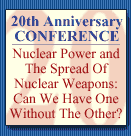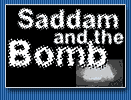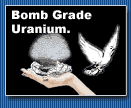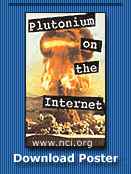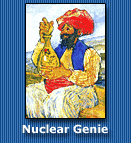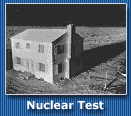|
 addresses four basic contributors to the
spread of nuclear weapons: addresses four basic contributors to the
spread of nuclear weapons:
- the
growing presence of atom-bomb materials in civilian nuclear power and
research programs;
- the
behavior of nuclear-weapon states that stimulates or facilitates other
states going nuclear;
- the
loopholes in U.S. nuclear-export laws and international nuclear
agreements that permit the spread of nuclear-weapon materials and
technology, and
- the
tensions that drive regional rivals to seek nuclear weapons.
In particular, we focus on the urgency of
eliminating weapons-usable materials---plutonium and highly enriched
uranium---from civilian nuclear programs and for disposing of excess stocks
of these materials from military programs.
Among its initiatives,
 is:
is:
 opposing Bush Administration efforts to reverse a
25-year policy against extracting plutonium from the spent fuel of U.S.
commercial nuclear power plants ---as well as opposing the development of
pyroprocessing and other experimental technologies for reprocessing of spent
fuel; opposing Bush Administration efforts to reverse a
25-year policy against extracting plutonium from the spent fuel of U.S.
commercial nuclear power plants ---as well as opposing the development of
pyroprocessing and other experimental technologies for reprocessing of spent
fuel;
 advocating the
direct disposal of excess U.S. and Russian warhead plutonium as waste instead
of introducing it as fuel in civilian power reactors, thereby reducing risks
of nuclear theft in Russia and thwarting efforts to revitalize the plutonium
industry in the United States; advocating the
direct disposal of excess U.S. and Russian warhead plutonium as waste instead
of introducing it as fuel in civilian power reactors, thereby reducing risks
of nuclear theft in Russia and thwarting efforts to revitalize the plutonium
industry in the United States;
 seeking the shutdown of spent-fuel reprocessing and
plutonium-fuel programs in Europe and Japan, and opposing U.S. assistance to
their plutonium programs; seeking the shutdown of spent-fuel reprocessing and
plutonium-fuel programs in Europe and Japan, and opposing U.S. assistance to
their plutonium programs;
 seeking the shutdown of military plutonium-separation
plants in the United States; seeking the shutdown of military plutonium-separation
plants in the United States;
 opposing U.S.
Nuclear Regulatory Commission (NRC) licensing of exports of bomb-grade,
highly enriched uranium (HEU) fuel for overseas research reactors, except in
compliance with U.S. law requiring that these reactors agree to convert to
non-weapon-usable, low-enriched fuel as soon as possible; opposing U.S.
Nuclear Regulatory Commission (NRC) licensing of exports of bomb-grade,
highly enriched uranium (HEU) fuel for overseas research reactors, except in
compliance with U.S. law requiring that these reactors agree to convert to
non-weapon-usable, low-enriched fuel as soon as possible;
 opposing industry efforts to commercialize new
nuclear-power plant designs such as the Pebble Bed Modular Reactor until the
proliferation hazards of a rebirth of nuclear energy are fully examined; opposing industry efforts to commercialize new
nuclear-power plant designs such as the Pebble Bed Modular Reactor until the
proliferation hazards of a rebirth of nuclear energy are fully examined;
 opposing industry efforts to weaken NRC security
requirements to protect against terrorist attacks on U.S. nuclear-power
plants; opposing industry efforts to weaken NRC security
requirements to protect against terrorist attacks on U.S. nuclear-power
plants;
 examining the threat of nuclear terrorism in the face of
an emerging black market in plutonium and bomb-grade uranium, as recommended
by NCI's International Task Force on Prevention of Nuclear Terrorism, which
first identified nuclear terrorism as a major security risk; examining the threat of nuclear terrorism in the face of
an emerging black market in plutonium and bomb-grade uranium, as recommended
by NCI's International Task Force on Prevention of Nuclear Terrorism, which
first identified nuclear terrorism as a major security risk;
 examining ways to cap and eventually roll back the
nuclear weapons programs of India and Pakistan and to prevent further
development of nuclear weapons in Iraq, Iran and North Korea; examining ways to cap and eventually roll back the
nuclear weapons programs of India and Pakistan and to prevent further
development of nuclear weapons in Iraq, Iran and North Korea;
 analyzing the limitations of international and national
safeguards arrangements to detect or
prevent diversions and thefts of plutonium from commercial plants for use in
nuclear weapons; analyzing the limitations of international and national
safeguards arrangements to detect or
prevent diversions and thefts of plutonium from commercial plants for use in
nuclear weapons;
 advocating stricter international safety codes for
transports of plutonium and highly radioactive waste and advising en-route
countries of their legal rights under the "precautionary principle"
in the face of safety, security and environmental risks associated with these
shipments; and advocating stricter international safety codes for
transports of plutonium and highly radioactive waste and advising en-route
countries of their legal rights under the "precautionary principle"
in the face of safety, security and environmental risks associated with these
shipments; and
 maintaining our award-winning website to provide daily
updates on the latest proliferation news and developments. maintaining our award-winning website to provide daily
updates on the latest proliferation news and developments.
|


